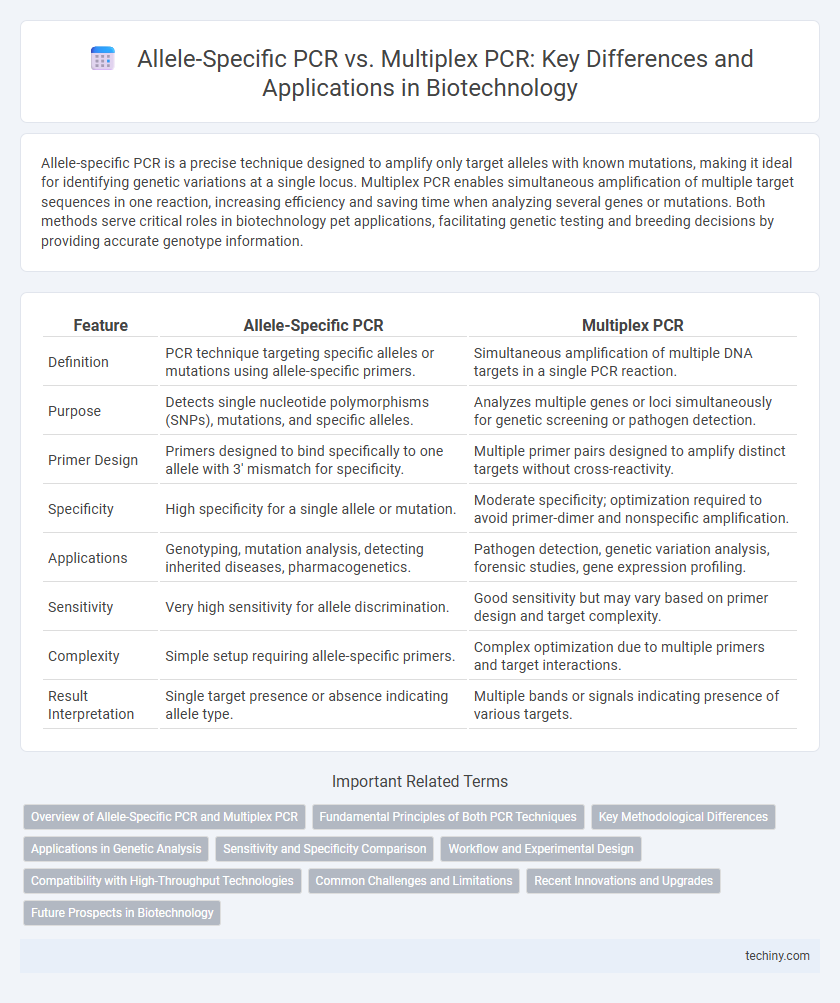Allele-specific PCR is a precise technique designed to amplify only target alleles with known mutations, making it ideal for identifying genetic variations at a single locus. Multiplex PCR enables simultaneous amplification of multiple target sequences in one reaction, increasing efficiency and saving time when analyzing several genes or mutations. Both methods serve critical roles in biotechnology pet applications, facilitating genetic testing and breeding decisions by providing accurate genotype information.
Table of Comparison
| Feature | Allele-Specific PCR | Multiplex PCR |
|---|---|---|
| Definition | PCR technique targeting specific alleles or mutations using allele-specific primers. | Simultaneous amplification of multiple DNA targets in a single PCR reaction. |
| Purpose | Detects single nucleotide polymorphisms (SNPs), mutations, and specific alleles. | Analyzes multiple genes or loci simultaneously for genetic screening or pathogen detection. |
| Primer Design | Primers designed to bind specifically to one allele with 3' mismatch for specificity. | Multiple primer pairs designed to amplify distinct targets without cross-reactivity. |
| Specificity | High specificity for a single allele or mutation. | Moderate specificity; optimization required to avoid primer-dimer and nonspecific amplification. |
| Applications | Genotyping, mutation analysis, detecting inherited diseases, pharmacogenetics. | Pathogen detection, genetic variation analysis, forensic studies, gene expression profiling. |
| Sensitivity | Very high sensitivity for allele discrimination. | Good sensitivity but may vary based on primer design and target complexity. |
| Complexity | Simple setup requiring allele-specific primers. | Complex optimization due to multiple primers and target interactions. |
| Result Interpretation | Single target presence or absence indicating allele type. | Multiple bands or signals indicating presence of various targets. |
Overview of Allele-Specific PCR and Multiplex PCR
Allele-specific PCR (AS-PCR) enables precise detection of single nucleotide polymorphisms by using primers that selectively amplify specific alleles, making it highly effective for genetic mutation analysis. Multiplex PCR simultaneously amplifies multiple target sequences in a single reaction through the use of multiple primer sets, increasing throughput and efficiency in genotyping or pathogen detection. Both techniques are essential in molecular diagnostics, with AS-PCR providing allele discrimination and multiplex PCR offering comprehensive simultaneous analysis.
Fundamental Principles of Both PCR Techniques
Allele-specific PCR relies on designing primers that selectively amplify a target allele by exploiting sequence differences at the 3' end, enabling precise detection of specific mutations or single nucleotide polymorphisms (SNPs). Multiplex PCR utilizes multiple primer sets in a single reaction to simultaneously amplify several DNA targets, increasing throughput and efficiency in genetic analysis. Both techniques depend on thermal cycling, DNA polymerase activity, and primer-template hybridization, but differ fundamentally in primer design and application focus.
Key Methodological Differences
Allele-specific PCR targets and amplifies specific alleles by using primers designed to match single nucleotide polymorphisms, enabling precise detection of genetic variants. Multiplex PCR simultaneously amplifies multiple DNA sequences in a single reaction by employing several primer sets, increasing throughput and efficiency. Key methodological differences include primer design specificity in allele-specific PCR versus the challenge of optimizing multiple primer interactions in multiplex PCR.
Applications in Genetic Analysis
Allele-specific PCR enables precise detection of known single nucleotide polymorphisms, facilitating genotyping and mutation analysis with high specificity. Multiplex PCR allows simultaneous amplification of multiple target sequences, increasing efficiency in detecting various gene mutations or polymorphisms within a single reaction. Both techniques are critical in genetic analysis for disease diagnosis, pharmacogenomics, and population genetics studies, optimizing throughput and accuracy in detecting genetic variants.
Sensitivity and Specificity Comparison
Allele-specific PCR exhibits high specificity by targeting single nucleotide polymorphisms with precise primer design, enabling detection of rare mutations in heterogeneous samples. Multiplex PCR offers greater sensitivity for simultaneous amplification of multiple targets, enhancing throughput but potentially compromising specificity due to primer-dimer formation and cross-reactivity. The trade-off between sensitivity and specificity makes allele-specific PCR optimal for mutation confirmation, while multiplex PCR is preferred for broad screening applications in biotechnology.
Workflow and Experimental Design
Allele-specific PCR targets precise nucleotide variations with primers designed to amplify only specific alleles, enabling focused mutation detection in a streamlined workflow. Multiplex PCR amplifies multiple DNA targets simultaneously using multiple primer sets in a single reaction, requiring careful optimization of primer compatibility and reaction conditions. Experimental design in allele-specific PCR demands strict primer specificity for single nucleotide polymorphisms, while multiplex PCR design prioritizes balancing primer concentrations and minimizing primer-dimer formation to ensure efficient co-amplification of distinct genetic loci.
Compatibility with High-Throughput Technologies
Allele-specific PCR offers precise mutation detection but has limited throughput due to its single-target focus, making it less compatible with high-throughput platforms. Multiplex PCR enables simultaneous amplification of multiple targets, significantly enhancing throughput and compatibility with next-generation sequencing and automated analysis systems. High-throughput biotechnology applications favor multiplex PCR for efficient, large-scale genetic screening and diagnostics.
Common Challenges and Limitations
Allele-specific PCR faces challenges such as primer design complexity and limited sensitivity in detecting rare mutations, which can lead to false negatives. Multiplex PCR often encounters limitations related to primer-dimer formation and amplification bias, affecting the accurate quantification of multiple targets simultaneously. Both methods require meticulous optimization to avoid non-specific amplification and ensure reliable results in genetic analysis.
Recent Innovations and Upgrades
Recent innovations in allele-specific PCR have enhanced primer design algorithms using machine learning to improve mutation detection sensitivity and specificity, enabling high-throughput screening of rare variants. Multiplex PCR advancements include the development of barcoded primers and microfluidic platforms, allowing simultaneous amplification of dozens of loci with minimized primer-dimer formation and increased reaction efficiency. Integration of digital PCR technology with both methods has further improved quantification precision and enabled absolute quantification of target alleles in complex genetic samples.
Future Prospects in Biotechnology
Allele-specific PCR offers precise detection of single nucleotide polymorphisms, enabling targeted gene editing and personalized medicine advancements in biotechnology. Multiplex PCR enhances throughput by amplifying multiple targets simultaneously, accelerating pathogen detection and genetic screening applications. Future prospects include integration with next-generation sequencing and CRISPR technologies to improve diagnostic accuracy and therapeutic development efficiency.
allele-specific PCR vs multiplex PCR Infographic

 techiny.com
techiny.com